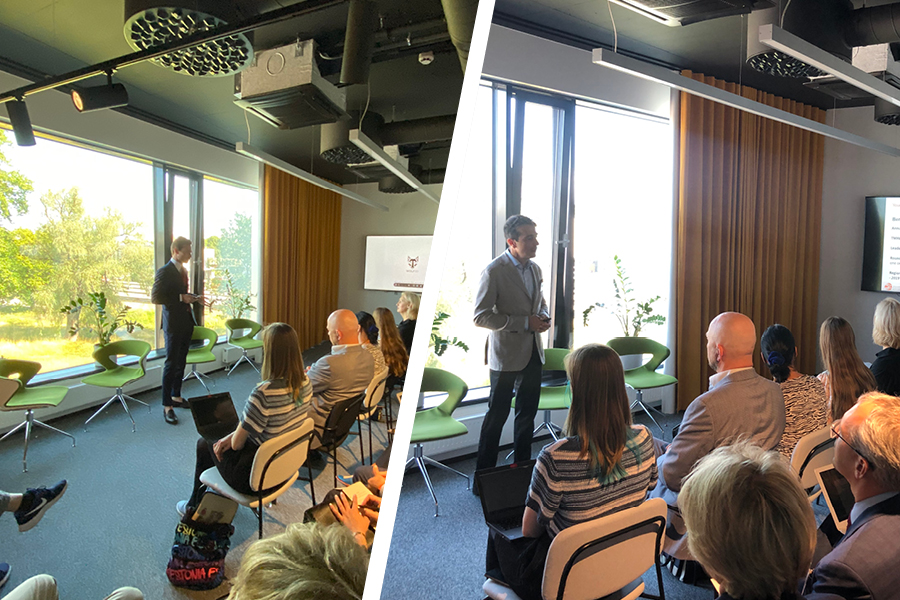INTA News
Young Practitioners Discuss How to Help the Next Unicorns of the Baltics Protect IP
Published: September 9, 2020
Ruta Pumputiene Ruta Pumputiene Law Firm Vilnius, Lithuania
 The technology-heavy Baltic countries of Estonia, Lithuania, and Latvia are becoming hotspots for startups. Recognizing this trend, INTA’s Young Practitioners Committee recently held an event offering guidance on intellectual property (IP) protection for new companies in the region.
The technology-heavy Baltic countries of Estonia, Lithuania, and Latvia are becoming hotspots for startups. Recognizing this trend, INTA’s Young Practitioners Committee recently held an event offering guidance on intellectual property (IP) protection for new companies in the region.
Despite their small size, the three Baltic countries are showing impressive results in digitalization and as a booming space for startups. Estonia alone is home to some of Europe’s fastest growing companies, including four unicorns (startups valued at more than US $1 billion). In the meantime, the neighboring countries of Latvia and Lithuania are also catching up. As a result, a need for effective and expeditious IP protection is a global challenge in this technology-heavy society, especially for startups.
Driven to discuss this need and related challenges, young legal practitioners from the three Baltic states gathered in Tallinn, Estonia, on August 7 for a reception and panel discussion on “Startups in the Baltics and Their IP Challenges.”
Njord Law Firm (Estonia), Ruta Pumputiene Law Firm (Lithuania), and Agency Tria Robit (Latvia) co-hosted the event. Approximately 30 IP practitioners across the Baltic states attended.
In his presentation, Bronislavs Baltrumovičs (Agency Tria Robit, Latvia) suggested startups first look at protecting their domain names. His overview of domain name dispute resolution policies around the world focused on the differences and similarities that exist within the Baltic countries. For example, Estonia fully implemented an alternative dispute resolution (ADR) model, which is an expedient alternative to court litigation. In contrast, an ADR procedure is not possible in Latvia and Lithuania; civil courts may solve domain disputes there.
Further pointing out differences, he noted that Estonia has a specific independent body for resolution of domain name disputes, the Domain Disputes Committee, which works under rules based on the international Uniform Domain Name Dispute Resolution Policy (UDRP). In Latvia and Lithuania, courts have exclusive competence and UDRP is not applicable. Yet despite these differences, remedies are available in all three Baltic countries, and overall, it is quite easy to get and protect domain names for startups in the Baltics.
Providing their first-hand experience, two entrepreneurs each presented their company’s successful journey from an idea to products accessible to a worldwide audience. Haver Järveoja (Wolf3D, Estonia) created the biggest 3D face database based on an avatar creation solution, and Almondi Esco (Imepilt, Estonia) developed an animation and transmedia studio which produces and develops movies, series, and games).
Mr. Järveoja pointed out how virtual worlds and video games are pushing the boundaries of IP law. Though the businesses of Wolf3D and Imepilt are different, both presenters agreed that when it comes to businesses and their IP, many young companies fail to recognize the breadth of their potential IP assets or to appreciate their importance. Although wholly avoidable, a number of repeated errors hamper startups from the capital-raising process to launch and beyond. For example, startups often use inappropriate documentation for their IP management, such as confidentiality or licensing agreements. However, one of the most important steps not to overlook, as Mr. Esco noted, is to develop or execute a well thought-out IP strategy.
The meeting concluded with a panel discussion moderated by Silja Elunurm (Njord Law Firm, Estonia), with panelists Peeter P. Mõtsküla (Triniti, Estonia), Alina Bogdanoviča (Agency Tria Robit, Latvia), and Kristina Vilkienė (State Patent Bureau, Lithuania). The panelists noted that entrepreneurs require passion, drive, and a stubborn perseverance borne of a determination to succeed.
The panel focused on how young practitioners can prepare to help the next Baltic unicorn manage its IP and avoid any hiccups, which they said can become liabilities when looking for angel investors or venture capital funding. To avoid such black marks, Ms. Vilkienė, strongly advised that IP practitioners and entrepreneurs maximize training, education, and capacity building programs designed to foster IP.
On a side note, the co-chair of the INTA Young Practitioners Committee, Events Subcommittee, Stelios Stafylakis (Brimondo, Sweden), shared his thoughts on the value of INTA for young practitioners and the best ways to become more involved with the Association. Following the startup discussion, attendees participated in a quiz that tested their knowledge about the region’s IP law.
Although every effort has been made to verify the accuracy of this article, readers are urged to check independently on matters of specific concern or interest.
© 2020 International Trademark Association